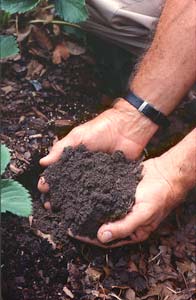
While most gardeners understand that organic matter is a "good thing," knowing exactly when and how much to use is elusive. Adding them to clay soils increases aeration and drainage; in sandy soils, it holds moisture and nutrients. Of course, other factors such as pH, soil texture, and cultivation timing greatly affect soil structure and nutrient availability, so you have to consider them also. Specific crops' nutrient requirements may also determine which soil treatments you should use.
However, effective use of organic soil amendments can improve soil texture; produce large, healthy yields; and save you money. Here's an explanation of what they are, how they work, and what you can do to maximize their benefits.
Two Key StagesThe decomposition process begins when microorganisms (bacteria, fungi, and molds) in partially decayed organic residues in the soil and compost feed on the fresh organic matter. Half old material to half new material is a good ratio.
In the first stage, fresh organic residues serve as food for soil microorganisms; when residues are plentiful, biological activity increases quickly. The microorganisms feed on the residues' carbon, nitrogen, and proteins. The kind of residue, the absence or abundance of microorganisms, moisture, temperature, and carbon-to-nitrogen ratio (C:N ratio) all determine the extent and speed of decomposition. The more microorganisms, for example, the faster it happens.
In the second stage, as microorganisms consume the organic material, biological activity slows. Some of them die, and others that can consume any woody plant materials increase in number. Then, the C:N ratio falls, and the organic-matter decomposition slows. At this mature stage, humus results from the residues that microorganisms didn't consume during the first stage. Different microorganisms then digest the stable compounds and excrete the indigestible residues. Nutrients remain but are only available slowly because they've been incorporated into the organic matter.
Make the Most of Soil ConditioningBy allowing some or all of the decomposition phases to occur in your soil (rather than in the compost pile), you'll improve soil structure. As microorganisms digest fresh organic material, they stabilize clumps of minerals and organic matter, called soil aggregates. High rates of biological activity create the good soil structure that allows root penetration, enhances drainage and oxygen flow, and distributes nutrients.
A Surprising Tip From an ExpertDr. Will Brinton of Woods End Research Laboratory in Mount Vernon, Maine, emphasizes that adding compost that's reached the humus stage won't have the same effect. The interaction and blending of the soil particles, active microorganisms, and partially decayed organic matter help condition your soil. So, if you need to improve soil drainage, texture, and water-retention, introduce immature organic material into your soil. For increasing primarily the nutrient reserves, add humus.
Nutritive Benefits of Various Organic ResiduesAdding different organic residues to the soil produces different results. Succulent green materials such as grass clippings, manure, fresh leaves, cover crops, and weeds contain carbons, but they're also rich in nitrogen. Because they have a low C:N ratio, the soil will absorb them rapidly, then release nutrients. With little decay-resistant material in them to enhance humus production, these soil amendments facilitate decomposition but aren't as instrumental in the humus phase.
In contrast, carbon-containing materials such as straw, sawdust, papers, wood chips, and dried leaves have low nitrogen levels and are high in carbohydrates and lignins (the bonds that connect woody cell walls of plants, making them decay-resistant). These substances are the primary building-blocks of stable humus and long-term nutrient reserves.
Humus: Nutrients in ReserveA reserve of stable, partially decomposed organic matter (humus) in the soil develops over several years and preserves the soil's physical integrity. Humus is a huge storehouse of solar energy; in your garden, it reduces erosion, increases water retention, and affects soil chemicals. For example, humus particles are negatively charged, attracting positively charged cations like calcium, magnesium, and potassium. Humus increases the surface area available to hold the cations, and it enriches the nutrient pool available to plant roots. Nitrogen is stored in a form that's released slowly, sustaining season-long growth. Soils that have been used for years without careful management generally lack this nutrient reserve, and that's when building stable humus is a high priorty.
Add Materals to Suit Your Soil's NeedsIf you usually add food wastes, manure, and green yard waste to your soil, try to add high-carbon residues to your compost pile, or mulch plants with straw. The additives create a balance between fostering biological activity and accumulating humus. You can also quickly improve soil structure by planting a cover crop such as buckwheat, or incorporating grass clippings or manure directly into the soil, rather than adding mature compost. (Fresh manure could burn plants, however, so if you add it, don't plant immediately afterward.) If you want to boost stable organic matter levels, a cover crop will contribute less than manure would.
In his book, Fertile Soil (agAccess, Davis, CA, 1990, $44 including shipping), Robert Parnes demonstrates that incorporating a layer of hay into your garden boosts the soil's organic-matter content more effectively than adding manure, and stable compost contributes more quickly to the level of stable organic matter. Except when you are reclaiming damaged soils or correcting for past imbalances, most garden soils need a balance of fresh and decomposed organic residues to fuel both decomposition stages constantly.
Conditions that affect buildup of organic matterTilling, the equivalent of aerating your compost pile, greatly affects the soil's level of stable organic matter. The resulting increased oxygen levels promote biological activity; consequently, organic amendments are necessary to compensate for further decomposition caused by soil cultivation. Excessive wind, heat, rain, and compaction hinder high biological activity. Grass or legume crops and organic mulches protect the soil and accomplish a crucial part of soil management: the creation and conservation of organic matter.
Temperature and MoistureDepending on your region, the difficulty of increasing your soil's organic matter level varies. In northern climates where temperatures drop for long periods, biological activity and decomposition decrease during those times. Tropical climates rarely accumulate organic matter because the warmer temperatures and high rainfall promote rapid decomposition of the organic matter.
In arid climates, humus may decay more slowly, but the soil's ability to accumulate and replace lost organic matter is hampered because dehydration also hinders the decay process. However, mulching can conserve moisture and enhance biological activity.
Tilling in the spring and fall helps minimize the loss of humus reserves because soil temperatures in some regions aren't high enough for vigorous biological activity. Fresh residues may pose a problem in cool or arid conditions because they decompose slowly and tie up nutrients. Composting, at least partially, may be prudent unless you can time your application appropriately for your region.
Unwanted Effects of Adding AmendmentsTo avoid nitrogen loss, weed growth, and plant diseases, add the right amendments at the right time. Microorganisms use nitrogen, and rapid microbial activity can also consume the soil's oxygen, leading to nitrogen loss: As soil organisms dismantle nitrates in their search for oxygen, nitrogen is left in a gaseous form that readily escapes. Wait at least two weeks between amending with immature residues and planting to allow nutrient excesses to stabilize, making nitrogen available.
Leaves, manure, grass clippings, and herbaceous and woody plants in various stages of decomposition are the raw materials to add to soil. Decomposition, however, requires specific conditions. The best conditions for decomposition are: soil temperatures above 55° F., adequate oxygen and moisture, and a pH level near 7 (neither acid nor alkaline).
Because decomposition in soil occurs without a compost pile's high temperatures (up to 145° F), plant diseases and weed seeds aren't killed. Carefully monitor the compost pile's temperature (using a temperature gauge) to raise the temperatures, then stop the decay process by spreading the compost and drying it out, or incorporating it into the soil at that point. Decomposition resumes in the garden soil. Good amendments that don't require sterilizing temperatures include straw, leaves, healthy lawn clippings, alfalfa pellets, and cocoa hulls.
Testing Your Soil's HealthLaboratories now use the knowledge of the dynamic qualities of soil fertility and organic matter described here in their tests. Woods End Laboratory stresses the living nature of the soil and the value of tests to gauge soil health. Tests measure respiration in soil and compost samples, which indicates the rate of biological activity.
Woods End now markets a kit to determine compost maturity, and this spring, a kit is available to test garden-soil microbial activity. Wallace Laboratories of California and other labs test for heavy metals and salt levels as well as for nutrients and organic matter. Contaminated organic residues can cause high levels of the kinds of heavy metals that municipal sludge sometimes contains. Such metals accumulate over time and can be toxic to microorganisms, plants, and people. Good management of organic matter will ease these problems. Alan York, a market-grower in California who uses organic methods, encourages testing to develop "visual confidence." Establishing a baseline measurement for your soils allows you to identify deficient or excess nutrients and metals and gauge the results of your later soil-building efforts. Regular testing and evaluation of the results over several growing seasons allow you to rely more on observation and less on frequent testing.
Labs report wide variations in the quality and content of bagged compost and manure. When possible, buy from local sources and from manufacturers that label the ingredients. If you plan to use large quantities of compost or manure, test samples to see if the product is appropriate for your planned use. If they're to be used in a seed-starting or potting mix, large amounts may kill plants that need a mature soil amendment. Retesting may be necessary in the future if you're unsure whether the manufacturer has consistent criteria for its finished product.
Whether you buy organic amendments or use the ones in your garden, you must manage them the same way. Building organic matter in soils is a slow process, and it may be easier to maintain it than to replace it. The results are clear: using good amendments and growing practices enhances biological activity and conserves organic matter in your soil for the future.
Carrie Chalmers is a professional gardener in Weston, Vermont.
Photography by the National Gardening Association.
 Victory Seed Company has all the seeds you want for your best garden in 2024.
Victory Seed Company has all the seeds you want for your best garden in 2024.
For 25 years, the family-owned Victory Seed Company has provided the highest quality vegetable, herb and flower seeds to families across the country. We are passionate about providing you the best seeds available that give excellent germination, robust plants, and the harvest you want. With a catalog of over a thousand varieties, we have everything, and our prices are the kinds that we'd want to pay. We have hundreds of yesterday's heirloom vegetables, as well as today's award winning hybrid selections. Get to know us by visiting our website and browsing through our online vegetable seed catalog.